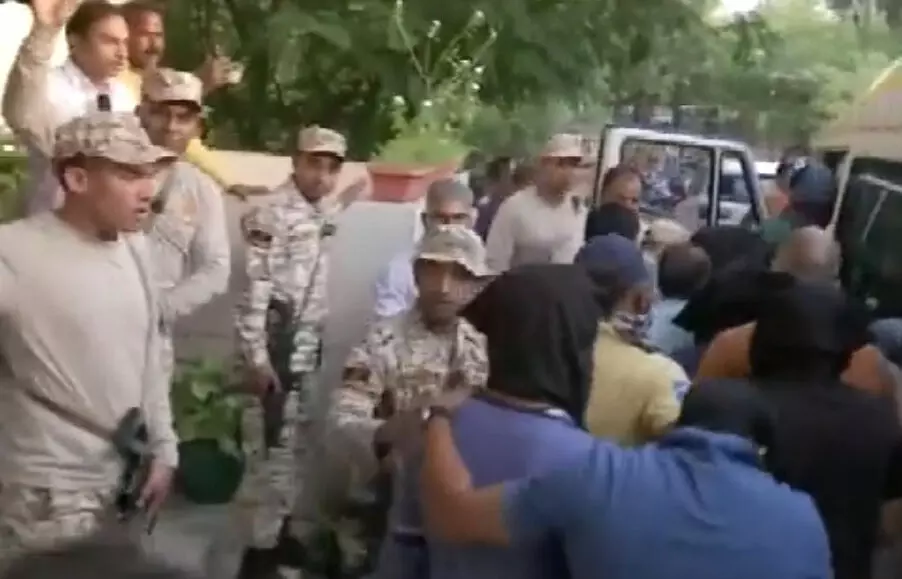One more terror suspect arrested in Hyderabad; HuT activities under probe
Mohammed Salman, a daily wage worker, is an accused along with the five persons arrested on Tuesday in Hyderabad in an Unlawful Activities (Prevention) Act (UAPA) case

HYDERABAD: One more terror suspect hailing from Jawahar Nagar was arrested in Hyderabad on Wednesday in a joint operation carried out by the Telangana police and Madhya Pradesh police. Mohammed Salman, a daily wage worker, is an accused, along with the five persons arrested on Tuesday in Hyderabad, in an Unlawful Activities (Prevention) Act (UAPA) case registered by the Bhopal police. With this, the number of the terror suspects detained in the two-day crackdown here rose to six.
Salman slipped out of the police dragnet on Tuesday when his house in Jawahar Nagar was raided on Tuesday. He was however captured on Wednesday before being shifted to Bhopal. The Madhya Pradesh police had earlier arrested 11 persons in connection with the same case and based on the leads provided by them, they carried out the raids in Hyderabad since Tuesday. Before the arrest of Salman, the police teams involved in the joint operation detained five suspects – Mohammed Saleem (41), Mohammed Abbas Ali (36), Abdur Rahman (33), Mohammed Hameed (30) and Sheikh Junaid (31) – on Tuesday.
The terror suspects came under the radar of the Indian intelligence agencies and subsequently the Bhopal police for their alleged links to Hizb-ur-Tahrir, an international terror organisation. All those arrested in Bhopal and now in Hyderabad are accused of being in touch with the outfit through social media platforms and encrypted communications applications supported on mobile phones.
HuT deadlier than dreaded ISIS?
Hizb-ut-Tahrir (HuT) is an outfit that, as per some perception, is threatening to become more dangerous than the ISIS, a proscribed terror organisation. With its tentacles (read network) spread across more than 50 countries, the outfit was banned by at least 16 countries. In India, the organisation aspires to establish Islamic Shariah rule by banishing the democratic governance system. To realise its nefarious objective, the organisation chose Madhya Pradesh as its primary base and began its activities in a fragmented manner. HuT trains its members to propagate the idea of Islam among youth and brainwash them against the current governance system to portray it as a failure and anti-Islamic. The members wanted to create a rebel group by turning the youths into disgruntled elements by injecting lies into their heads.
The organisation works towards its ultimate objective of enrolling youths in hordes by selling this idea and eventually prepare them for ‘jihad’. HuT has asked its members in India to mobilise resources and money in the form of donations for it to undertake its activities. Instilling fear among the general public by carrying out major terror strikes in big cities and crowded places is a classic intent as part of its modus operandi. They came under the radar of the intelligence agencies as they were planning to target big cities of Madhya Pradesh.
According to a previous press release by the National Investigation Agency (NIA), the UAPA case pertained to the conduct of secret ‘bayaan’ classes by the HuT members. “It was meant for radicalising youths to establish an Islamic state or caliphate and enforce the constitution written by radical Islamic preacher and HuT founder Taqi al Din al Nabhani,” the NIA release stated.
Three of the terror suspects, detained in the operation, are said to be revert-Muslims (converted Muslims), one of them being known for his Islamic classes and actively helping new revert Muslims in administrative matters. He is believed to be also on the radar of the Telangana police besides the central law enforcement agencies.
According to several agencies, HuT managed to evade global scrutiny even while spreading its ideology and was becoming a more dangerous ‘terrorist outfit’ than the dreaded ISIS. With inputs from global security agencies, India is aware of its expansion plans.
Founded in Jerusalem in 1952 and headquartered in London, the group has branches in Central Asia, Europe, South Asia and Southeast Asia, particularly in Indonesia, where it has managed to garner great influence, according to the reports of various global agencies.
In South Asia, HuT has a significant presence in Pakistan and Bangladesh. HuT claims to have organised a demonstration in 2010 at Batla House in Delhi in protest against Israel’s alleged atrocities. This was said to be one of the last reported HuT activities in India, according to security experts. The detained individuals are being questioned to elicit more information about the terror outfit.



